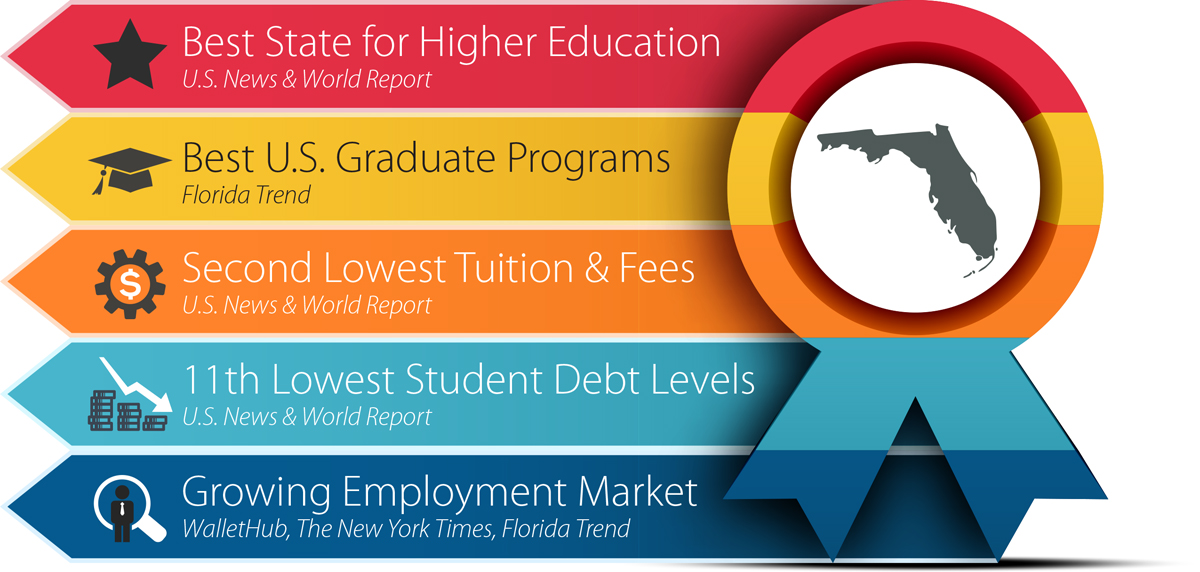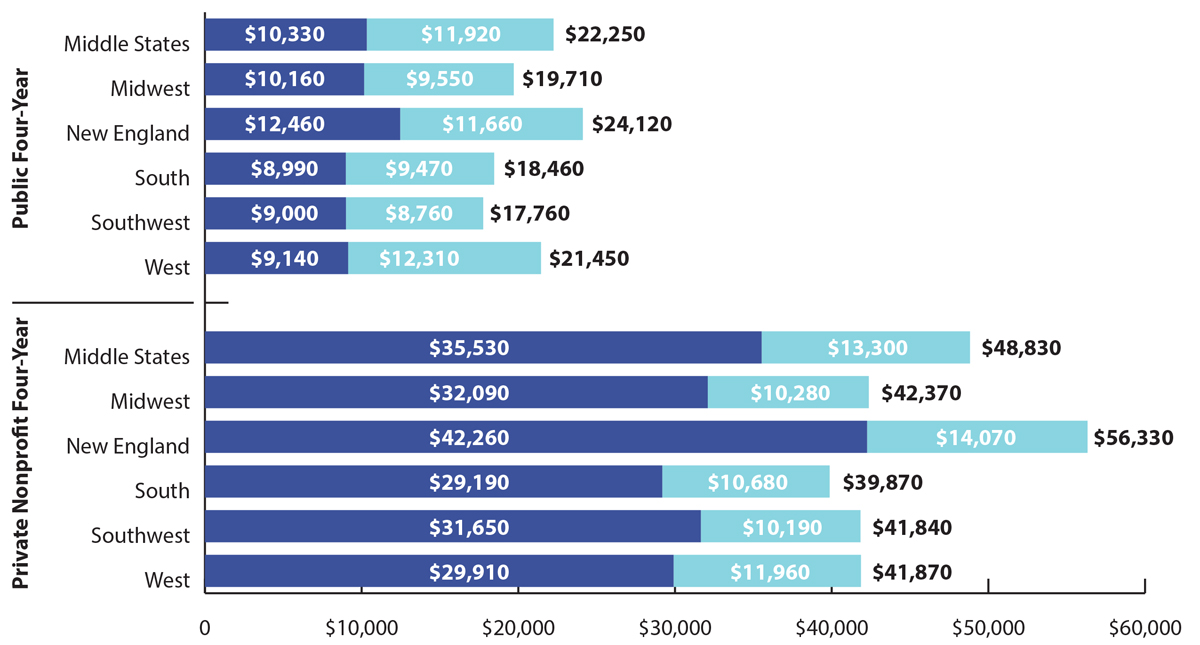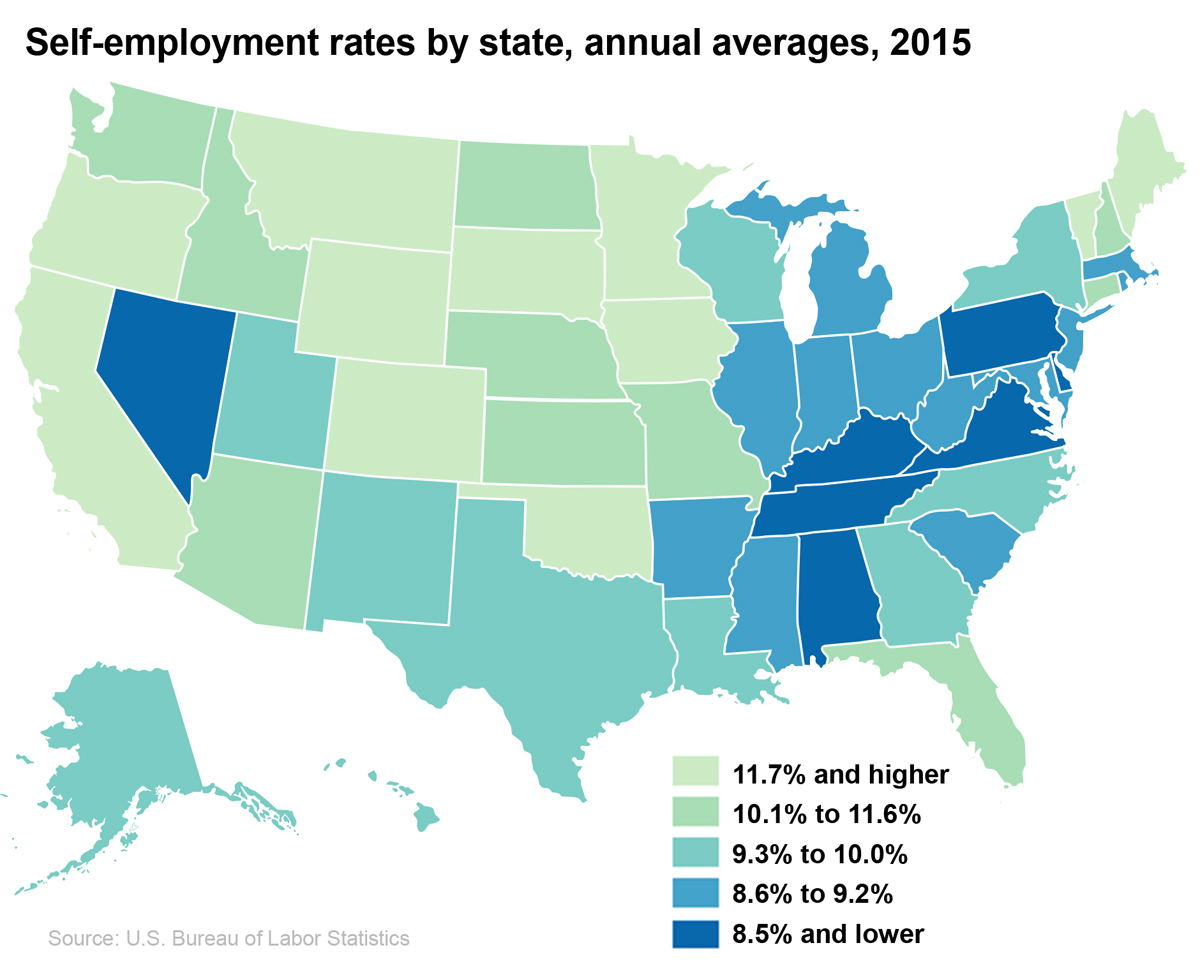
The Case for Going to College in Florida
The Benefits of Going to College in Florida | Academic Programs | Florida Tuition and Cost of Living | Economic Climate in Florida | The Florida Beach Lifestyle
The Case for Going to College in Florida
Florida is well known for its coastal lifestyle, sunny skies, vacation destinations and ties to the space program. It’s no wonder more than 113 million people visit Florida each year and 20+ million people make it their home. What people may not know about Florida is that it was named a Best State for Higher Education by U.S. News & World Report. Top quality academics, year-round good weather and some of the lowest tuition rates in the country are just a few of the reasons Florida is a great option for college.

The Benefits of Going to College in Florida
Students typically begin their college search with review of university academic programs in the field they plan to study. It can be hard to single out the “perfect” school because there are many high-achieving institutions in the country that offer a wide range of degrees and programs. Why go to college in Florida? Florida has much to offer college students, including the recent ranking as Best State for Higher Education by U.S. News & World Report. In addition, many Florida graduate programs also rank best in the nation, and Florida’s MBA programs have worldwide appeal.
Notable in report by U.S. News & World Report is Florida’s position as second lowest in tuition and fees, and 11th lowest for the amount of debt students hold at graduation. Public and private institutions across Florida are often featured in Fiske Guide to Colleges, Bloomberg Businessweek and The Chronicle of Higher Education.
The state also boasts a growing employment market, with a number of Florida cities named in the Top 100 Best Places for Jobs (WalletHub2017). The New York Times cited Tampa as the fourth fastest-growing job market in the nation, while Florida Trend reported that Kiplinger ranked the sunshine state third among “States with the Fastest Job Growth.” Florida’s 23-county High Tech Corridor promotes high tech growth in key industries such as agritechnology, aviation and aerospace, information technology, medical technology and sustainable energy, among others.
Combined with some of the world’s best beaches, beautiful and diverse environmental habitats and lower cost of living rates, Florida is an attractive option for a great college experience.
“I decided to go outside my comfort zone and go to college in Florida. With two aunts and a lot of cousins already living nearby, it would be like a home away from home in case I needed anything or just wanted to escape from school for a little while.”
—Erin S., Ocean Engineering
Academic Programs in Florida
Florida’s public and private colleges and universities earn international recognition for their academic achievements, experienced faculty and cutting-edge research, as noted in the links below. Florida is often a sought-after college destination for students interested in environmental, biological and chemical sciences due to the exceptional access to unique ecosystems, space and technology research, and medical and clinical services programs.
STEM and management programs are also some of the most popular degree choices with many universities offering unique programs not found in other parts of the country. Take Florida Tech’s degree programs in aquaculture, human-centered design and ocean engineering, for example.
What benefits students most is to consider their niche in order to find a college environment that best suits their goals and personality, from the size of the school, flexibility of the curriculum, culture of the neighboring community, type of specialized programs, number of research and intern opportunities, options for graduate school, and access to alumni. Private schools often offer smaller class sizes, professor-led mentorship, customizable curriculum, merit aid and other benefits. All these factors combine to give students a wide range of options from some of the best academic programs in Florida.
Florida Colleges & Universities Nationally Recognized Rankings
- U.S. News & World Report Best States for Higher Education
- Forbes Best Value Colleges
- U.S. News & World Report – Most International Students
- U.S. News National Universities Ranking (12 Public and Private Florida Schools Included)
Other Acknowledgements
- Best Value Colleges in Florida
- Best Colleges in Florida
- Kiplinger Best College Values
- Best in the U.S. for Graduate Employability
- Best Colleges in Florida
- Top Florida Colleges
“One of the main reasons I came to study meteorology in Florida was for the weather. Florida’s weather phenomena, like hurricanes and abundant lightning, means every day is exciting in some way. It’s nothing like where I live in Delaware.”
—Amanda S., Meteorology
Florida Tuition and Cost of Living
The cost of going to college involves a wide variety of factors from tuition, books and housing to travel, equipment, clothing, food and more. Many individuals are entering college well after high school and may have job and family-related expenses to consider. Additionally, the College Board cites in the 2016 Trends in College Pricing report that students are taking longer to graduate, which results in higher education costs due to delays in obtaining the rewards of post-college earnings.
In Florida, there are 72 public and private colleges and universities. Compared to other states across the nation, Florida is a top pick when considering its warm weather, southern charm and year-round activities. Along with the attractive climate, Florida schools make the mark for their value when considering expenses for tuition and cost of living. A recent CNBC report noted Florida second in a list of the ten most affordable states for a public college education, and the College Board Trends in College Pricing report shows public and private tuition and room and board costs to be lowest in the South.
Along with academic costs, living in Florida is less costly, too. Students do not need to purchase expensive winter clothing, pay heating bills or buy specialty winter equipment for their car.
Florida’s rental housing market (with the exception of Miami) is often more affordable than markets in the Northeast and West. Working students will not pay state income tax, and Florida has one of the lowest sales tax rates in the nation, making everyday purchases like food, gas and nights out on the town less costly. In essence, the cost of going to college in Florida can be much less than many other locations.
Average Tuition, Room and Board Costs

*College Board Trends in College Pricing
Necessary Florida College Gear
 |
Water Shoes |
 |
Skateboard |
 |
Flip Flops |
 |
Bathing Suit |
 |
Sunscreen |
 |
Sunglasses |
 |
Surge Protector |
 |
Umbrella |
 |
Surfboard |
Economic Climate in Florida
According to Glassdoor Economic Research, America’s labor market is the healthiest it’s been in a generation, with rising pay, record numbers of unfilled jobs and historically low unemployment. In the 5 Jobs Trends to Watch Report for 2017, Glassdoor researchers report that increasingly, tech graduates (such as data scientists, mobile developers and database engineers) are in high demand for every industry from health care to finance and retail. Fast Company reports that technology and the related software development and computer system careers are areas that will continue to grow, along with artificial intelligence, healthcare and engineering.
Today’s graduates, more than ever before, also venture out on their own to create a career. The Bureau of Labor Statistics reports more than 15.5 million people (10% of the workforce) are self-employed across a variety of occupations, with Florida’s self-employment rate equal to the national average. Add to this a continued trend in remote employment and the job opportunities expand even more.
Florida’s economic indicators bode well for students graduating from college now and into the future. Looking at Florida’s job growth rate compiled by the Bureau of Labor Statistics shows that it is outpacing the national average. Florida job growth for college graduates is even better. Florida Institute of Technology has even been ranked among the best in the United States for graduate employability by Times Higher Education in the U.S. University Employability Survey.

The Bureau reports that the fastest growing jobs through 2024 include occupations such as:
- Alternative Energy
- Occupational Therapy
- Medical
- Research Analysts
- Logistics
High paying occupations include a wide range of jobs in:
- Medicine
- Computing
- Information Technology
- Cybersecurity
- Engineering
The Occupational Outlook Handbook has detailed information on a large number of occupations and can provide employment and salary projections for career planning.
“I grew up in Connecticut, but decided to look for a college in Florida. My grandparents live in Jupiter, and it made me feel comfortable knowing I had family close by. Plus, I can’t go very long without some of grandma’s cheesecake.”
—Warren P., Aviation
The Florida Beach Lifestyle
Let’s face it, there are many reasons to live in Florida and to go to college in Florida. Being near the beach, year-round warm weather and access to numerous outdoor activities are the perfect complement to classes, friends and nightlife. Florida’s climate is warm, subtropical and has an average year-round temperature of 82°F. Aside from classes and studying, student life may include sports or participation in Greek or service clubs. There’s so much more to a Florida life than what’s on campus.
In a few minutes, or a few hours, the landscape can change from coastal beaches and waterways, hidden springs and underwater caves, to vast farmland or the largest mangrove ecosystem and breeding ground for wading birds in North America in Florida’s Everglades.
Florida is home to popular theme parks, as well as vibrant cities, music festivals, cultural events and a fusion of cuisines. Cruises are within easy access from ports in Jacksonville, Cape Canaveral, Miami and Tampa. And the next generation of space exploration is happening on the Space Coast in Cape Canaveral. From a national drag racing event in Gainesville, music and art festival featuring 50 bands in West Palm Beach to the winter strawberry capital of the world in Plant City, Florida has a diverse offering of things to do. And let’s not forget that Florida college students are already living in the heart of one of the country’s popular spring break destinations, making it easy and less costly to hit the beach!
Close Proximity to Family
Cappex.com, a free website that connects students with colleges and scholarships, studied college search behavior by the more than a million students that use their platform to search for colleges each year. Cappex found that while Ivy-league name recognition is high on the list for high school freshmen when they first think about college, students become more in tune with other factors by the time senior year rolls around. In addition to academics, geography and being close to family rank high on the list for seniors searching for a college and are two big reasons Florida is a popular choice. Moderate sunny weather is a huge attraction for students and if extended family or grandparents live in Florida to provide support and connection to home, all the better.
#FLORIDAFUNFACTS
- Florida has 1,197 miles of coastline and 663 miles of beaches.
- The Pinellas Trail, a 47-mile hiking/biking trail connecting St. Petersburg with central and north Pinellas County, is the longest urban linear trail in the eastern United States.
- Florida is home to the most lightning strikes each year.
- 40% of the world’s orange juice supply comes from Florida.
- Florida is the only place in the world where alligators and crocodiles co-exist.
- No matter where you are in Florida, you’re never more than 90 miles from the beach.


 Give to Florida Tech
Give to Florida Tech